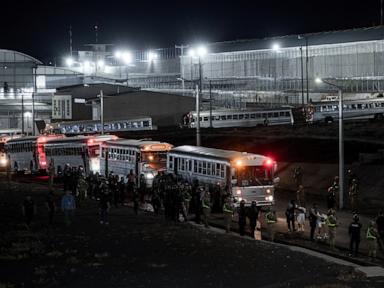The Trump administration’s admission that it sent a Maryland man to a Salvadoran prison in error shows the need for outside oversight, critics say, as they fight efforts to ship migrants to overseas facilities.
Kilmar Abrego Garcia, a Salvadoran national, was sent by the Trump administration to El Salvador’s Terrorism Confinement Center (CECOT) despite being granted protection from removal in 2019 by an immigration judge.
The Trump team admitted the mistake — something it said was due to “an administrative error” — but has argued it would be difficult to secure Abrego Garcia’s return from outside the U.S. where they must “entreat—or even cajole” a close ally to release him.
The disclosure comes as the Trump administration has used both the Alien Enemies Act and immigration authorities to fly both Venezuelan and Salvadoran men it’s accused of being gang members to CECOT without any review of their alleged ties.
"The critical need for due process is becoming clearer every day as more and more evidence emerges that the government is making mistakes in rushing people off to a notorious foreign prison,” Lee Gelernt, the lead attorney in a case from the American Civil Liberties Union challenging President Trump’s use of the Alien Enemies Act, told The Hill by email.
While Abrego Garcia is the only man who the Trump administration has said was sent to the prison in error, others whose families have challenged their removal to El Salvador have said they were wrongly deported. Some had entered the country legally and had pending cases before immigration court judges.
One man, Andry José Hernández Romero, was flown to El Salvador as his attorneys were preparing to respond to the allegations in court, only to be suddenly unable to reach their client.
And like Abrego Garcia, attorneys for many of the imprisoned men have said they were falsely accused of gang ties, often based simply on the presence of tattoos.
Hernández Romero, who is a gay makeup artist from Venezuela, was accused of being a member of the Tren de Aragua gang based on having tattoos reading “mom” and “dad” in Spanish beneath a crown. Friends have said the crown was a nod to the Three Kings Day celebrations his hometown is known for.
Another, a soccer player, was identified as a gang member citing his tattoos, but the designs were a nod to the soccer team Real Madrid.
Nayna Gupta, policy director at the American Immigration Council, said the Trump administration is essentially disappearing people.
“What the Trump administration is doing with these removals to El Salvador is sidestepping that already low level of due process in immigration proceedings and taking us to a place where they're essentially yanking people out of their ongoing cases or the street and putting them on a flight somewhere else based on an accusation that they have not proved at all,” she said.
“Innocent until proven guilty — that is an American norm. We understand that to be like a key component of our democracy,” she said, one is afforded to all in the U.S. regardless of whether they are citizens.
Trump’s ignition of the Alien Enemies Act accuses the Tren de Aragua gang of acting at the behest of the Venezuelan government, clearing the way for the deportation of any Venezuelan in the U.S. over the age of 14 the administration says is a member of Tren de Aragua.
A smaller number of Salvadoran nationals have been deported ...











